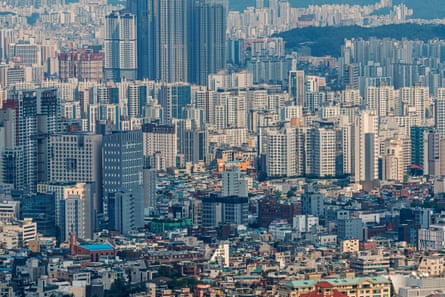For tourists visiting South Korea, one of the world’s most technologically advanced nations, navigating the country’s urban heartlands can prove surprisingly frustrating for one simple reason: Google Maps just doesn’t work effectively.
But on 11 August that could change, as South Korean authorities are set to decide whether to finally grant Google’s request to export the country’s detailed mapping data to overseas servers. Such a move would open up functionality that allows the app to give detailed directions and show users the best routes to travel.
It is a debate spanning nearly two decades which has evolved into a broader test of how democracies balance digital sovereignty with economic openness. Local industry groups are warning of market domination from foreign companies, while those who back Google’s request argue restrictions harm tourism and innovation.
South Korea is one of only a handful of countries – alongside China and North Korea – in which Google Maps fails to function properly.
While Google dominates online services in most of the world, South Korea’s digital landscape is instead controlled by local “portal” companies Naver and Kakao.
These platforms provide comprehensive services including search engines, email, news, messaging, music and maps, creating a formidable ecosystem that has long resisted foreign tech dominance. The firms provide precise public mapping data but store it on domestic servers as required by law.
Google already licenses the same data from a domestic provider but can use it only to display information like landmarks and local businesses – and, crucially, cannot provide directions for users.
Security concerns and local opposition
Google says it needs to distribute and process the data through its global server network to provide real-time navigation for billions of users worldwide, including those researching Korean destinations from abroad.
The government has consistently refused, citing national security risks.
However, Google argues that the mapping data it seeks has already undergone security review and had sensitive locations removed – and the same data is used by domestic competitors. Google has said it will blur satellite imagery of any sensitive facilities if required by authorities.
Opposition to Google’s request is fierce. The Korean Association of Spatial Information, Surveying and Mapping (Kasm), which represents 2,600 local companies, reports 90% opposition from 239 member companies surveyed, fearing market domination by the US tech company.
“The government must listen to industry concerns,” says Kim Seok-jong, chair of Kasm, warning of potential “industry devastation”.
Critics also warn that approving the request could set a precedent for other foreign companies, particularly from China. Apple has also applied for similar permissions, according to local media reports.
The government has offered an alternative, saying Google could access the detailed mapping data if it built local datacentres, as domestic competitors do, although this would still not resolve the issue of processing data on Google servers around the world.
In 2022, the vulnerability of such an approach came to light when one of Kakao’s datacentres caught fire, leaving millions without access to the company’s messaging, mapping and ride-hailing services.
Tourism impact
Korea Tourism Organisation data shows complaints increased 71% last year, with Google Maps accounting for 30% of all app-related grievances, primarily due to the non-functioning directions functionality.
Francesco from Italy told the Guardian he was “surprised” to find that Google Maps didn’t work well when he arrived in Seoul for a 1-week trip.
“It’s just so annoying. I search for a reviewed restaurant on Google, then I have to switch to Naver Maps (a local app) just for the walking directions,” he said.
“I heard it’s a security issue,” said Loic, a tourist from France, “but I feel it’s more about protecting local businesses.”
The restrictions have also drawn criticism from tourism startups and tech advocates, who argue that without access to internationally standard mapping tools, they will struggle to build globally competitive services, stifling growth.
Previous government reviews in 2007 and 2016 both resulted in rejection.
This time, an inter-agency committee including defence and intelligence representatives has already extended its original May deadline, citing the need for deeper consultation with security agencies and industry stakeholders.
The issue has featured in broader US-Korea trade tensions, with Washington’s trade office listing South Korea’s mapping restrictions as a “non-tariff trade barrier”.
South Korea recently concluded trade negotiations that secured 15% tariffs rather than the initially threatened 25%, with President Lee Jae Myung scheduled to meet President Donald Trump at the White House in the coming days or weeks.
South Korea’s transport ministry was unavailable for comment ahead of the decision.
Google says its Maps software helps people “navigate and explore with confidence using fresh information about places, roads and traffic” and that it works closely with “local governments to make Maps helpful for locals and visitors”.









